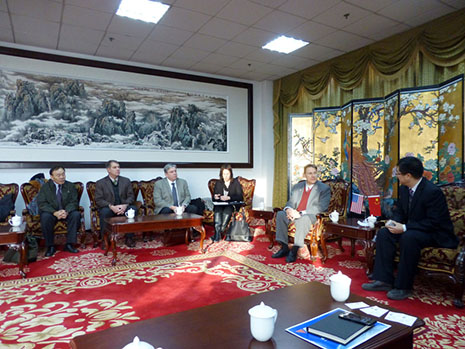
FAYETTEVILLE, Ark. – Administrators from the Dale Bumpers College of Agricultural, Food and Life Sciences at the University of Arkansas recently visited three universities in China to explore educational and research opportunities for students and faculty.
Asia is a leader in the global food marketplace, and China has been identified as a key region for educational and professional opportunities in areas of food safety, quality, production and distribution.
“The Chinese government is open to collaboration on research and education, and this is an opportunity for students, faculty and the U of A to make a strong impact on the state’s economy by expanding and engaging our workforce in the global marketplace,” said Dean Mike Vayda. “China is a major trade partner for the U.S. and is a prominent location for Arkansas stakeholders serving the international food retail and distribution industries.”
Along with Vayda, Leslie Edgar, director of international programs; Mike Looper, chair of the animal science department; Rick Bennett, chair of the plant pathology department; and Pengyin Chen, professor of plant breeding and genetics, met with administrators at the Chinese universities to establish and expand programs for students and faculty.
Bennett was focused on plant-based program opportunities while Looper concentrated on animal agriculture.
As a result of these visits, memorandums of understanding are being drafted with Northeast Agricultural University in Harbin and Northwest Agricultural and Forestry University in Yangling. An expansion of a current relationship with China Agricultural University established through a poultry-based memorandum of understanding in 2012 is also being discussed.
China Agricultural University is regarded as the No. 1 agricultural university in the country and has exchange programs with several American universities.
“China agriculture feeds about 20 percent of the world on 9 percent of the farming lands in the world,” said Edgar. “It is important for our students to understand China agriculture as well as their progress in agricultural product development and the food supply chain. China is also looking for international partners and this is a chance to expand our graduate programs.”
Northeast Agricultural University is home to the Key laboratory for soybean research as well as the National Soybean Institute.
Northwest Agricultural and Forestry University is where Chen earned his bachelor’s in agronomy and his master’s in plant breeding and genetics. The university is highly regarded for its research in wheat breeding and plant diseases. It is interested in creating a new student exchange program, similar to current programs it has with Auburn University and the University of Maryland.
Bumpers College hopes to collaborate with Northeast Agriculture University and Northwest Agricultural and Forestry University on a visiting professor program, student short-term study programs during semester breaks, and a scientific writing course for faculty, post-doctoral students and graduate students.
“My objectives were to explore opportunities for enhancing the animal science graduate program and increasing collaboration among research faculty,” said Looper. “Goals of animal science are similar around the globe – to produce more animal protein to meet demand with fewer resources while minimizing the environmental footprint. We also had discussions about the importance of animal well-being during the production cycle. There was great interest in funding Chinese students studying in Arkansas.”
Graduate students and a faculty members at Northwest A&F University have already expressed interest in coming to the U of A, and funding is available from the Chinese government for collaborative scientific research between Chinese and U.S. faculty, according to Vayda.
“We will be able to promote student and faculty education, research and experience,” said Vayda. “We’re matching existing research and academic strengths in plant science, poultry, international trade, food branding and marketing, animal science and food safety. This also aligns with the university’s goal of becoming a top 50 public research university.”
Part of the exchange may include U of A faculty, under the direction of Bennett and Looper, leading a scientific writing course in English at Northwest A&F.
“This is an opportunity to collaborate with Chinese scientists,” said Vayda. “In China, it’s common for children to begin learning English in kindergarten, but it’s not their primary language. Their quality of science is good, but they can benefit by optimizing the presentation of their work in internationally prominent journals in English. This will help Arkansas by advancing the state of science worldwide. If they have major breakthroughs, we’ll know about it.”
“This course could offer value to faculty, post-doctorate and graduate students in any discipline through effective training in communicating research findings in English-based scientific journals and through our visiting scholar program,” said Edgar.
In addition to meeting with administrators and touring the three universities, the group visited China’s National Soybean Institute, Wan Da Shan Dairy, the Heilongjiang Academy of Agricultural Science and the China Academy of Agricultural Science.
Topics
Contacts
Leslie Edgar, director and associate professor
Bumpers College International Programs Office
479-575-6770,
Robby Edwards, director of communications
Bumpers College
479-575-4625,